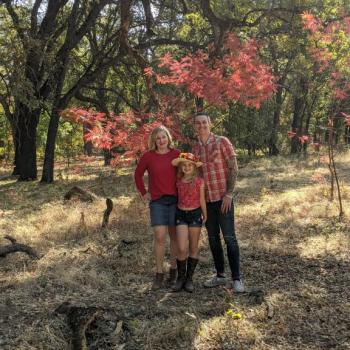
I am not what most would define as a “typical, masculine man.” Sure, I have some traditionally masculine traits—strength, courage, virility, and so on—but, to one degree or another, all of us, men, women, and those don’t fit neatly into these binary categories, possess these same traits. As Swiss psychiatrist Carl Jung taught, within each man exists a feminine principle (the “anima”) and within each woman exists a masculine one (the “animus”).[1] In other words, men are not simply “masculine,” or whatever their current culture defines as masculine, and women are not simply “feminine,” or whatever their current culture defines as feminine.
However, given that we are all too prone to think dualistically about things—i.e., black/white, up/down, left/right, tall/short, skinny/fat, etc.—we tend toward placing binary labels onto ourselves: humans are either “man” or “woman,” men are “masculine” while women are “feminine,” sexuality is expressed as either “gay” or “straight,” and so on and so forth. To that end, when a man like myself comes along, one who is in no way the embodiment of cultural or religious masculinity, they are often unfairly judged as soft, or weak, or effeminate, and then bullied accordingly.
Some of the bullying, of course, is more overt than others. For instance, on three distinct occasions over the course of my adult life, I’ve had groups of passersby derogatorily yell out “f*gg*t,” laugh to themselves, and then speed off down the road. Why they did this I can only speculate—if I had to take a stab at it, I’d say they were making up for something—but I believe it shows us how our culture treats those who don’t quite fit the stereotypical social norms of what it means to be “a real man”—after all, real men aren’t thin, they don’t wear black skinny jeans and tight-fitting tees, and they don’t have “girly” mannerisms (all qualities I tend to possess).
Social stigmatization and ostracization isn’t always this overt and obvious, however. For example, I can recall receiving an email some years back from who I thought was a friend where he ridiculed and berated me about all the ways in which I took advantage of my wife. He didn’t base this scorning off any conversation he had with her, or after spending any amount of time with us in our home or outside of it, but entirely due to the fact that she made more money than I did and that I spent more time at home performing what are commonly referred to as “women’s duties.” This probably goes without saying, but for this gentleman, and for most of our culture (although things are slowly getting better), complementarianism is the way things are supposed to work: a man is supposed to be the breadwinner, the one who spends all his time grinding away at work; while the woman is supposed to be raising the kids, cleaning the house, and doing the laundry. And the fact that my family life didn’t fit within this cultural, and might I say, toxic religious framework, was all this person needed in order to essentially revoke my man-card.
Now, there is of course nothing wrong with men who do fit into the cultural and religious standards of what it means to be masculine. If a man loves NASCAR, shooting deer, and bringing home the bacon, for example, then by all means, that’s what he should do. There is no problem there. The problem, then, is with this being the standard of manliness. Not all men are alike, and there is no standard for what a man should be—or, at least there shouldn’t be. Standards lead to expectations, and as we’ve probably all experienced, having too many expectations will prevent us from being astonished in life. They will, without a doubt, thwart our ability to lead spontaneous and authentic lives. And further yet, placing people into gender-specific roles can be out and out harmful, primarily for women but for some men as well.
For the good part of thirty years, this was my experience. I didn’t like being bullied for how I looked or what clothes I wore; I didn’t like being virtually emasculated for having a smaller income than my wife; I didn’t like being forced to fit into a complementarian system (and neither did my feminist wife!). So, when possible, I protected myself by essentially lying about who I was, emotionally fusing with what I had always been told being a “real man” was all about. I convinced myself and others that I was purely an intellectual, void of experiencing any emotions whatsoever; after all, women are the ones who are supposed to be emotional, while men are purely rational creatures (feel free to chuckle at my sarcasm). And as such, I was living as only half a person; I was denying my “anima,” as Jung called it.
Sadly, this is the harm that is done when we create these standards of expectation. We cause ourselves and others to live these lives in which everything becomes a façade for fear of being pushed to the fringes of society. Which is why, as men, we need to recognize our feminine side. We need to recognize our “anima.” Even the bad-ass, type-A men out there—the Hemingways, Stalones, and Kennedys—have a feminine side. And not only is that okay, but it should be celebrated.
I’m thoroughly convinced, then, that to be truly masculine is to not deny your femininity. Just as doubt is not the opposite of faith, femininity is not the opposite of manliness. Both masculine and feminine are what it means to be a man. (Just as both feminine and masculine are what it means to be a woman.) And sure, everything is on a spectrum. Some men will naturally fall on the more masculine side of things—if we want to put it that way—while others will display much more feminine qualities. But only with both qualities recognized will we truly live authentic lives. Only when we are soft, nurturing, and compassionate, for instance, will we truly appreciate our God-given masculinity.
[1] See, for instance, von Franz, M.L., et al. Man and His Symbols, 205–6, and Jung, Carl G. Alchemical Studies, 180.
*Note, this piece will be included in a yet to be titled book that I’m writing with new author Danielle Kingstrom. It will be out sometime in 2020 (I’m guessing) and will cover everything from sex and intimacy to parenting.













